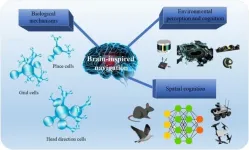(Press-News.org) In the ever-evolving field of robotics, a groundbreaking approach has emerged, revolutionizing how robots perceive, navigate, and interact with their environments. This new frontier, known as brain-inspired navigation technology, integrates insights from neuroscience into robotics, offering enhanced capabilities and efficiency.
Brain-inspired navigation technologies are not just a mere improvement over traditional methods; they represent a paradigm shift. By mimicking the neural mechanisms of animals, these technologies provide robots with the ability to navigate through complex and unknown terrains with unprecedented accuracy and adaptability.
At the heart of this technology lies the concept of spatial cognition, which is central to how animals, including humans, navigate their environments. Spatial cognition involves the brain's ability to organize and interpret spatial data for navigation and memory. Robots equipped with brain-inspired navigation systems utilize a multi-layered network model that integrates sensory data from multiple sources. This model allows the robot to create a 'cognitive map' of its surroundings, much like the neural maps created by the hippocampus in the human brain.
One of the significant advantages of brain-inspired navigation is its robustness in challenging environments. Traditional navigation systems often struggle with dynamic and unpredictable settings, where the reliance on pre-mapped routes and landmarks can lead to failures. In contrast, brain-inspired systems continuously learn and adapt, improving their navigational strategies over time. This capability is particularly beneficial in environments like disaster zones or extraterrestrial surfaces, where prior mapping is either impossible or impractical.
Moreover, these systems significantly reduce energy consumption and computational needs. By focusing only on essential data and employing efficient neural network models, robots can operate longer and perform more complex tasks without the need for frequent recharging or maintenance.
The technology's applications are vast and varied. For instance, autonomous vehicles equipped with brain-inspired systems could navigate more safely and efficiently, reacting in real-time to sudden changes in traffic conditions or road layouts. Similarly, drones used for delivery services could plan their routes more effectively, avoiding obstacles and optimizing delivery times.
Despite its promising potential, the development of brain-inspired navigation technology faces several challenges. Integrating biological principles into mechanical systems is inherently complex, requiring multidisciplinary efforts from fields such as neuroscience, cognitive science, robotics, and artificial intelligence. Moreover, these systems must be scalable and versatile enough to be customized for different types of robotic platforms and applications.
As researchers continue to unravel the mysteries of the brain's navigational capabilities, the future of robotics looks increasingly intertwined with the principles of neuroscience. The collaboration across disciplines promises not only to advance our understanding of the brain but also to pave the way for a new generation of intelligent robots. These robots will not only assist in mundane tasks but also perform critical roles in search and rescue operations, planetary exploration, and much more.
In conclusion, brain-inspired navigation technology represents a significant leap forward in robotics, merging the abstract with the applied, the biological with the mechanical, and the theoretical with the practical. As this technology continues to evolve, it will undoubtedly open new horizons for robotic applications, making machines an even more integral part of our daily lives and work.
The paper, "A Review of Brain-Inspired Cognition and Navigation Technology for Mobile Robots," was published in the journal Cyborg and Bionic Systems on Jun 27, 2024, at DOI: https://spj.science.org/doi/10.34133/cbsystems.0128
END
The future of robotics: Brain-inspired technologies paving the way
2024-08-22
ELSE PRESS RELEASES FROM THIS DATE:
IHME’s 2024 Roux Prize awarded to Community Health Impact Coalition CEO – recognized for contributions to improve population health
2024-08-22
On behalf of the Community Health Impact Coalition (CHIC), Dr. Madeleine Ballard, global health leader and CEO of CHIC, is the Institute for Health Metrics and Evaluation’s 2024 Roux Prize winner. The award recognizes Dr. Ballard’s work alongside thousands of community health workers (CHWs) to secure quality care for all, through evidence-based health systems benefiting millions of people across the world.
Half of the world's population lacks access to essential health services. Around the globe, CHWs have stepped up to address this critical gap and deliver care in a way that improves access, increases equity, and saves lives. Despite their ...
New detectable gravitational wave source from collapsing stars predicted from simulations
2024-08-22
The death of a massive, rapidly spinning star can shake the universe. And the resulting ripples — known as gravitational waves — could be felt by instruments on Earth, according to new research published August 22 in The Astrophysical Journal Letters. These new sources of gravitational waves just await discovery, the scientists behind the research predict.
The gravitational waves emerge following the violent deaths of rapidly rotating stars 15 to 20 times the mass of the sun. Upon running ...
New study examines use of opioids for chronic cough
2024-08-22
INDIANAPOLIS – Chronic cough, with symptoms lasting more than eight weeks, affects approximately one in 10 adults. Cough is among the most common reasons for seeking medical care in the United States, yet chronic cough is difficult to treat. One of the largest studies of chronic cough and one of the first to explore the use of opioids, which are known to suppress cough, to treat these patients, has found that 20 percent of patients with chronic cough received a prescription for a cough suppressant containing an opioid.
With the goals of estimating opioid prescription in the chronic cough population and of informing alternative treatment ...
SwRI develops novel methodology for measuring blood-brain barrier permeability
2024-08-22
SAN ANTONIO — August 22, 2024 —Scientists at Southwest Research Institute have developed a new screening method to identify drug formulations that can penetrate the blood-brain barrier (BBB), to facilitate treatment of brain diseases and conditions.
“The BBB protects the brain and central nervous system from potentially harmful substances in the bloodstream, regulating the transport of essential nutrients and ions while maintaining the stability of the central nervous system,” said Research Engineer Nicholas McMahon, from SwRI’s Bioengineering group. “However, the very characteristics that make the BBB such an ...
Role of bitter polyphenols in the regulation of blood sugar
2024-08-22
Bioactive compounds like polyphenols and their health benefits have long captured public attention and interest. Commonly present in plant-based food like fruits, vegetables, seeds, coffee, and tea, the polyphenols have a strong bitter taste and, in the normal course, is excreted by our body due to poor absorption.
The polyphenols interact with human bitter taste receptors also known as Type 2 taste receptors (T2R) expressed within and outside the oral cavity. Notably, the activation of T2R expressed along the ...
Promising treatment for rectal cancer confirmed in major study
2024-08-22
A new treatment for locally advanced rectal cancer shows favourable results in that surgery can sometimes be avoided completely. It also reduces the risk of recurrence. The method has been confirmed as effective in a comprehensive study conducted at Uppsala University and published in eClinicalMedicine.
“The tumour disappears completely more often, thereby increasing the chance of avoiding surgery and retaining normal rectum and rectal function. Moreover, there are fewer metastases,” says Bengt Glimelius, Professor of Oncology ...
Chronic cough may be hereditary
2024-08-22
Chronic cough is among the most common reasons for seeking medical care, with middle-aged women the group most affected. New studies at Uppsala University also show that this condition appears to be a hereditary phenomenon. The studies have been published in ERJ Open Research and PLOS ONE.
“More than 10% of the population has a chronic cough, which has been shown to entail several negative consequences: reduced quality of life, reduced ability to work and voice problems. At present, we have insufficient knowledge about ...
Universal flu vaccine candidate protects against infection in mice
2024-08-22
Highlights:
Flu vaccine efficacy varies year to year.
A universal flu vaccine would protect people against all influenza strains that infect humans and last more than a season.
A new vaccine candidate incorporates proteins from 8 strains of influenza.
Recent tests of the candidate show efficacy in animal models, and the researchers hope to move to clinical trials soon.
Washington, D.C.—Annual flu vaccines protect against severe infection, but they vary in efficacy and may not match the most virulent strains ...
$20M community-driven research funding aims to reduce inequities, improve health outcomes
2024-08-22
DALLAS, August 22, 2024 — A new $20 million research initiative will engage the people most impacted by health disparities in developing solutions that may help improve their overall health and well-being. The American Heart Association, celebrating 100 years of lifesaving service as the world’s leading nonprofit organization focused on heart and brain health for all, and the Robert Wood Johnson Foundation (RWJF), a leading national philanthropy dedicated to taking bold leaps to transform health, are ...
Novel redox-active metal-organic framework as an anode material for Li batteries operating in freezing conditions
2024-08-22
The Korea Institute of Energy Research (KIER) has developed a redox-active metal-organic hybrid electrode material (SKIER-5) for Li batteries that remains stable in cold conditions as low as minus 20 degrees Celsius. By addressing the limitations of graphite as an anode material of conventional Li batteries under freezing conditions, SKIER-5 has the potential to be a superior alternative. This novel material can be used in Li batteries for a variety of applications, including electric vehicles, drones, and ultra-small electronic devices, even in low temperatures.
Currently, ...







